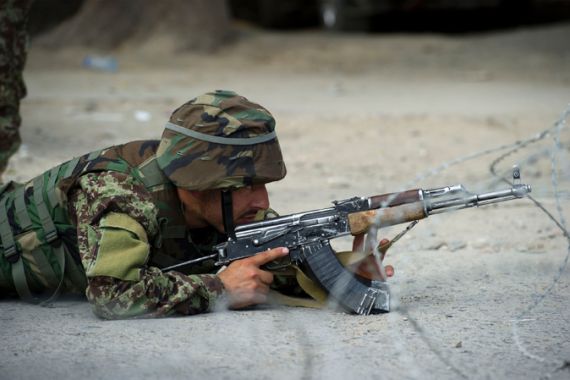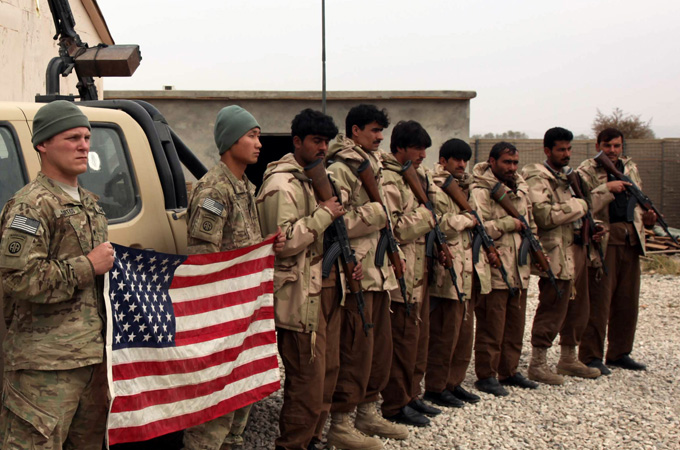‘Jump-start’ to nowhere
The current US approach to secret negotiations with the Taliban are ‘fatally flawed’ and must be re-evaluated.

 |
| The secret negotiations between the US and the Taliban does not include the Afghan government [EPA] |
Washington, DC, United States – It would appear that when US Secretary of State Hillary Rodham Clinton spoke in February of last year at the Asia Society, where she advocated for a negotiated political solution with the Taliban and laid out the red lines for a potential ultimate deal, she was not engaged in idle theorising. Multiple news reports of the past few days reveal that, in fact, US representatives have been holding a series of secret talks with the Taliban, both in Germany and in Qatar, during the ten months since.
Now, we are told, the talks have reached a “crucial stage”, where mutual “confidence-building” measures are being considered. The first of these has apparently already been realised, at least in principle, with agreement to open an official Taliban liaison office in Doha. Next on the agenda is the potential transfer of several former senior Taliban officials from prison cells at Guantanamo to the custody of the Afghan government, presumably as a first stage toward their ultimate release.
Reciprocal measures from the Taliban side are, perhaps significantly, much less developed, and reportedly include requests for the Taliban to formally cut ties with al-Qaeda, to accept the elected Afghan government, and to agree to bargain in good faith. A proposal for eventual consideration would be a declaration of “ceasefire zones”, perhaps to be established in conjunction with the turnover of local security responsibility to Afghan government forces in the areas concerned.
US officials, speaking strictly without attribution, are careful, nonetheless, to stress the difficulties going forward. One such official rates the chances of ultimate success in reaching a negotiated solution to the conflict at no more than 30 per cent.
I wish I could share his optimism.
|
“The entire US approach to these negotiations is deeply, indeed fatally, flawed.“ – Robert Grenier |
That is not to suggest that the idea of holding talks with the Taliban is a bad one. For the US, in principle, closing with the enemy at multiple levels in the context of its “fight, talk, build” strategy is sound, whatever the limitations in its implementation. And establishing an official Taliban office through which to hold such talks helps to put an end to the macabre farce of imposters and suicide bombers posing as insurgent emissaries.
That said, however, it strikes me that the entire US approach to these negotiations is deeply, indeed fatally, flawed.
Flawed negotiations
Begin with their composition. The talks thus far have been strictly a two-way affair between the US and the Taliban. As with all aspects of its current engagement in Afghanistan, the US has deemed this venture too important to be left to its Afghan allies. This plays directly into the prejudices and political narrative of the Taliban, and sets a precedent which will be hard to reverse later on. The Taliban does not refer to itself as a movement, or as an insurgent force; it retains its old title: The Islamic Emirate of Afghanistan. In their minds, the Taliban are still the legitimate government of the country. They have no desire whatsoever to negotiate with people whom they consider dupes of a foreign power. Why negotiate, in their minds, with the puppet? Better to negotiate with the puppet master on the terms of his departure.
The Americans are aware of the unfortunate optics of the current situation, but assert that the present discussions are merely a “jump start”, after which the US will broker negotiations between the two principal Afghan parties to the current hostilities. In my experience, one is usually best advised to begin as one means to go on.
Of course, the US will have to play a prominent and muscular role in any future intra-Afghan talks in any case, if for no other reason than to overcome a likely deficit in political imagination on both sides. But the US has made the prospect of such a transition all the harder by its current approach.
Second, the focus on frankly lopsided “confidence-building measures” betrays a lack of concrete realism in US thinking. One cannot have much confidence in unattributed stories concerning what corresponding confidence-building arrangements the US might seek, but immediate Taliban acceptance of the elected Afghan government is a non-starter at this stage, and a “formal” cut in ties to al-Qaeda would be meaningless and unverifiable. It would be far better to focus on localised ceasefires in the relatively near term, if for no other reason than to force the traditional Taliban leadership to demonstrate its claimed control over fighters on the ground, which is highly questionable in many areas.
Finally, the US is again displaying an unfortunate and characteristic orientation in favour of process over substance. US officials may believe they have adequately set out the desired “end-state” towards which discussions should be vectored by dictating red-lines for an ultimate agreement with the Taliban, including a break with al-Qaeda, a renunciation of violence (that is, disarmament), and acceptance of a current Afghan constitution which the insurgent party had no hand in drafting. But the fact is that the current Taliban leadership is constitutionally incapable of meeting such demands. Whatever their post-9/11 mental evolution, the Taliban remains an organisation bound to a Manichean governing vision characterised by primitive theocratic obscurantism, unacceptable to the vast majority of Afghans, which it therefore feels bound to enforce through violence and intimidation. The idea that the Taliban could become just another political party, contesting elections under the current constitution, borders on the ludicrous.
|
“The idea that the Taliban could become just another political party, contesting elections under the current constitution, borders on the ludicrous.” – Robert Grenier |
Focusing on the ‘end-state’
That is not an argument against negotiations. Instead, it is an argument that these negotiations, which can only usefully be conducted among Afghans, should focus on the end-state: That is, on concrete structures and means of power-sharing, with the understanding that an ultimate agreement may well – indeed, almost certainly will – require constitutional adjustments. This does not begin to suggest that such negotiations would lead in linear fashion to a mutually agreed outcome acceptable to a majority of the Afghan people. They might, however, help make clear to Afghans, including those within a Taliban structure which is hardly monolithic, what genuine national reconciliation might look like – if not under the current Taliban leadership, then perhaps including some elements of the movement.
In the end, it is likely that the only thing which will prove persuasive to the Taliban, and convince it of the need to reach accommodation with those large elements of the Afghan population which have never accepted their rule, is clear evidence that those willing to resist Taliban oppression will enjoy the continuing aid and assistance of the US government, permanently barring a complete Taliban takeover by force. The US side has reportedly stressed to the Taliban that the alternative to a negotiated settlement is an endless struggle which the insurgents can never win. The long-term US commitment to Afghanistan on which the credibility of such a threat depends, however, will have to be demonstrated, and not, as now, merely asserted. Such proof will be long in coming. In the meantime, the negotiating process should contribute to formulation of a genuinely achievable settlement. The current US approach does not.
Robert L Grenier is chairman of ERG Partners, a financial advisory and consulting firm. He retired from the CIA in 2006, following a 27-year career in the CIA’s Clandestine Service. Grenier served as Director of the CIA Counter-Terrorism Centre (CTC) from 2004 to 2006, coordinated CIA activities in Iraq from 2002 to 2004 as the Iraq Mission Manager, and was the CIA Chief of Station in Islamabad, Pakistan, before and after the 9/11 attacks.
Previously, he was the deputy National Intelligence Officer for the Near East and South Asia, and also served as the CIA’s chief of operational training. He is credited with founding the CIA’s Counter-Proliferation Division. Grenier is now a life member of the Council on Foreign Relations, and speaks and writes frequently on foreign policy issues.
The views expressed in this article are the author’s own and do not necessarily reflect Al Jazeera’s editorial policy.
